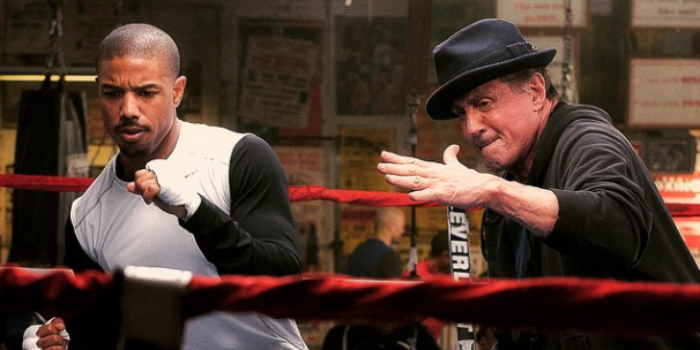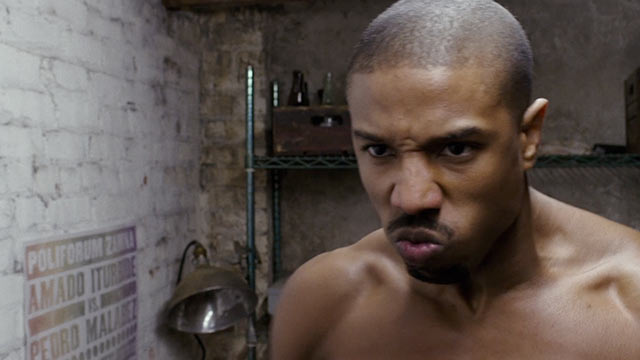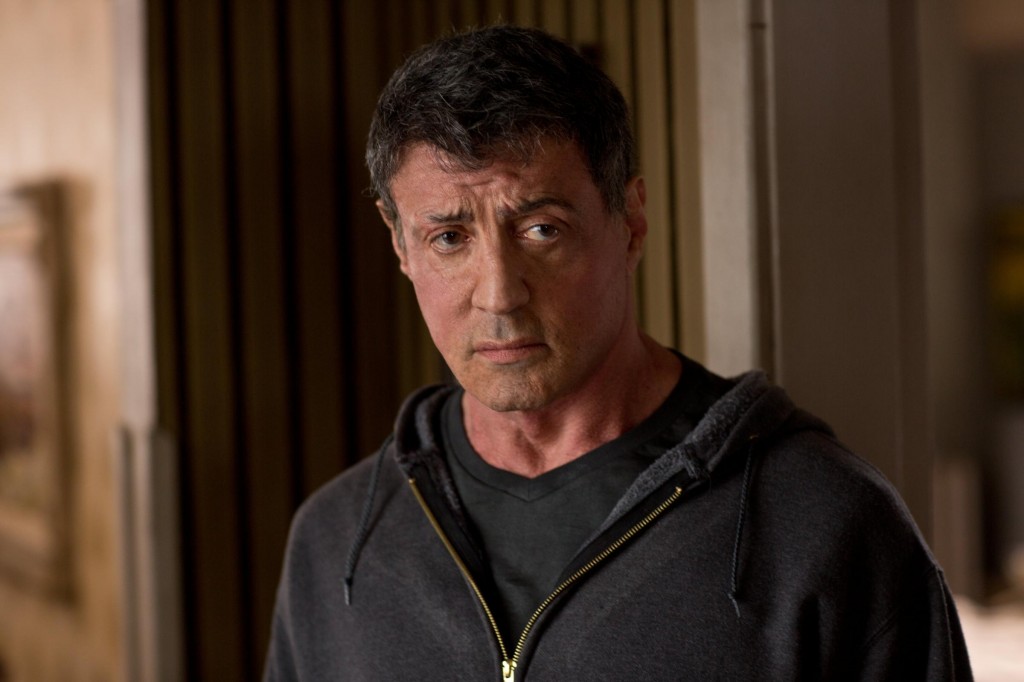For better or worse, there’s no arguing we’re in the era of peak franchise in Hollywood. Of the year’s top 10 grossers thus far, seven are sequels or spinoffs, one is based on a novel, and another on a fairy tale made into an animated movie 55 years ago. The sole “original” idea—Inside Out—trades on the goodwill of a powerhouse name brand in Pixar.
That’s not to say franchise entertainment is bad. Mad Max: Fury Road, a follow-up to a franchise dormant since 1985, was critically acclaimed, and the year’s box office champ Jurassic World was a solid if simple crowdpleaser. What confounds those who (often snobbishly) rail against the abundance of tentpole movies is the usual failure to do much more than go, “Hey, remember this thing you loved? Here’s another one.” Can these tried and true ideas of the past overcome archetypal storytelling and deliver a story that speaks to audiences in the present?
Creed, a spin-off to the Rocky franchise that’s spanned nearly 40 years and six films, suffers from none of the weaknesses that befall belated franchise revivals like this one. Like Sylvester Stallone’s Italian Stallion, the film overcomes incredible odds and achieves two nearly impossible goals: it stands up to the legend that preceded it and steps out of its shadow. If you love Rocky, you’ll love Creed. If you don’t…you’ll still love Creed.
The premise is simple: troubled amateur fighter Adonis Johnson (Michael B. Jordan) is the son of Apollo Creed, the former world heavyweight championship boxer brilliantly played by Carl Weathers in four Rocky films. Anxious to make a name in boxing on his own terms, Johnson sets out to Philadelphia to find Rocky Balboa (Stallone), Creed’s former rival turned friend. Along the way, they ostensibly help each other grow as fighters inside the ring and out.
Creed’s story beats play like a remixed Rocky, where Stallone took “another bum from the neighborhood” and gave him a million-to-one shot at greatness. With a famous bloodline that can’t be kept a secret and a two-time champion in his corner, Adonis’ road may seem more cleanly paved, but he’s a character who grows throughout the film. With an intense physical presence and more than a little of Weathers’ gleam in his eye, Jordan’s portrayal of Adonis should establish him a star in a way that this year’s dreadful Fantastic Four never could.
Like Rocky before it, Creed is only peripherally about boxing. It might be a cliche to say Philadelphia is a character in the film, but like the original film 39 years before, Creed shows Philly as it is today, with hotshots racing motorbikes down the street and brotherly love accompanying every cheesesteak. Creed also has a potent romance between Jordan and Tessa Thompson as Bianca, a soulful singer with an interesting character trait too good to spoil here. Thompson is almost the anti-Adrian, all focused energy where Talia Shire is passive but resolute in the original film.
And then there’s Balboa. Let’s face facts: Sylvester Stallone is Rocky. Up to now, every time he’s stepped in the role, it’s been from his screenplay, and in four of the six films, he was behind the camera as well as in front of it. And every film perfectly mirrors Stallone’s personal arc: he’s been the arresting underdog (Rocky), the challenger who still has something to prove (Rocky II), the uncertain champion (Rocky III), the champion with nothing to prove (Rocky IV), the overextended legend who almost loses it all (Rocky V), and the seeming has-been who proves his worth against all odds (Rocky Balboa).
Now, Stallone turns the character over to director Ryan Coogler (Fruitvale Station), who co-wrote the script with Aaron Covington. And what they achieve is nothing short of magical. While balancing Adonis’ story of discovery and ascension, Coogler, Covington and Stallone work together to deliver a satisfying encore to the Rocky story. 2006’s Rocky Balboa saw the Stallion fight back against the passage of time; here, standing alongside none of his allies from the preceding films, he’s ready to face the end of his road head-on even as his training of the young Creed infuses him with newfound vitality. It’s powerful stuff from Stallone; all would be wise to take the Best Supporting Oscar buzz seriously.
Creed also works wonders on a technical level. Maryse Alberti’s cinematography is the most stunning in the series since Bill Butler’s camera work in the first four Rocky films. The camera placement and deliberately slow cuts—a crucial early fight scene is presented in one unbroken minutes-long take—make the film a visual feast. Ludwig Goransson’s score is richly thematic, owing much to his eclectic career composing music for shows like Community and producing for Childish Gambino and HAIM. And call it pandering if you want, but diehard Rocky fans will find much to love in the margins of the film, from a crucial reprise of Bill Conti’s “Gonna Fly Now” to a choice quote from the original film written on the back of a gym’s t-shirt.
What makes Creed work, ultimately, is not how much nostalgia it can cram into 133 minutes. Unlike other sequels to franchises with rich histories, Creed uses none of its backstory as a tremendous crutch. (Spectre and Star Trek Into Darkness, for instance, ultimately left me cold by relying on references to past works that might not have made sense to new fans.) Audiences who only know Rocky as a movie (or six) about a boxer will find as much to enjoy as someone like me, who can’t watch the end of the first film without crying openly. If this is the age of peak franchise that we’re living in, Creed is something of a master class in how to satiate veteran fans without sacrificing what new audiences—hell, all audiences—want: a captivating, well-told story, no matter how archetypal it may be.
Bottom line: Creed is a movie you’ll be talking about long after the final bell rings. In an age where we love to talk about what sequels, remakes and reboots do wrong—and there is much to discuss there—it’s nice to have another example of how to look back while moving forward.
Creed is now playing.




Excellent review. Couldn’t agree more with this.